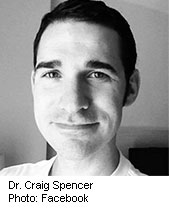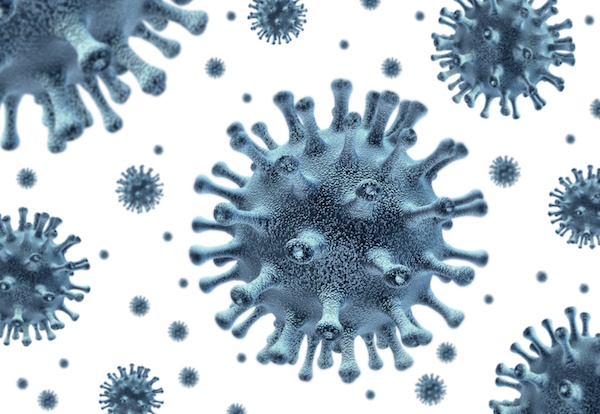
SUNDAY, Oct. 26, 2014 (HealthDay News) — The governors of New York and New Jersey on Sunday stood by strict new quarantine measures they have put in place for anyone returning via Kennedy and Newark Liberty airports who may have had contact with Ebola patients in Guinea, Liberia or Sierra Leone.
The measures, which exceed current federal guidelines, mean that people who had such contacts would be tested and kept in quarantine for 21 days, the longest known length of incubation of the Ebola virus.
The rules were first announced Friday by New York governor Andrew Cuomo and New Jersey governor Chris Christie, the New York Times reported.
However, Dr. Anthony Fauci, director of the U.S. National Institute of Allergy and Infectious Diseases, said on Sunday that he would not have backed such a quarantine because it could discourage health workers from going to West Africa to help battle the Ebola outbreak there, the Associated Press reported.
“The best way to protect us is to stop the epidemic in Africa, and we need those health care workers so we do not want to put them in a position where it makes it very, very uncomfortable for them to even volunteer to go.” Fauci said, according to the AP.
He added that self-monitoring works as well as a quarantine because people infected with Ebola do not become contagious until they start showing symptoms. Ebola is transmitted through direct contact with the bodily fluids of an infected person.
The decision to impose a quarantine in New York and New Jersey came a day after Dr. Craig Spencer, a New York City doctor who recently returned from West Africa, tested positive for Ebola. Spencer’s condition has worsened some, which is to be expected with the disease, the Times reported.
Spencer had been working with the medical aid agency Doctors Without Borders, helping to treat Ebola patients in Guinea, one of three West African countries hit hard by the disease.
On Saturday, New Jersey officials say that nurse Kaci Hickox, who had been working with Ebola patients in Sierra Leone and returned via Newark Liberty airport, had tested negative for the Ebola virus. However, under the new rules she will still be held under quarantine for the next 21 days, the Times said.
In an article published Saturday in the Dallas Morning News, Hickox described her experience at Newark Liberty, which she called “a frenzy of disorganization, fear and, most frightening, quarantine.”
“We need more health care workers to help fight the epidemic in West Africa,” she said. “The U.S. must treat returning health care workers with dignity and humanity.”
Still, Cuomo and Christie defended the new quarantine measures. “”A voluntary Ebola quarantine is not enough,” Cuomo said. “This is too serious a public health situation.”
But others agree with Hickox that such rules might deter health care personnel from joining the fight against Ebola in West Africa, where staff are desperately needed. According to the Times, the United Nation’s emergency Ebola mission says that over 19,000 medical staff are needed by Dec. 1 to fight the widening crisis, but numbers of new doctors, nurses and paramedics in the region remain far too low.
According to Times, Spencer, 33, had returned to New York City from Guinea on Oct. 14, and by 11 a.m. on Thursday morning he had developed a 100.3-degree fever. He immediately alerted Doctors Without Borders. Emergency medical workers in full personal protective gear transported him from his Manhattan apartment to an isolation unit at Bellevue Hospital.
Three people he was in contact with in recent days, including two friends and Spencer’s fiancee, have been placed in isolation, the Times reported.
On Tuesday, Spencer visited the High Line elevated park in Manhattan and ate at the Meatball Shop in the city’s West Village. On Wednesday, he traveled on two subway lines from Manhattan into the Williamsburg section of Brooklyn, visited a bowling alley there and then took a taxi back to Manhattan.
According to the Times, the taxi driver had no direct contact with Spencer and is not considered to be at risk.
Speaking Thursday night at a press conference at Bellevue, Mayor Bill de Blasio stressed that “being on the same subway car or living near a person with Ebola does not in itself put someone at risk.”
Out of an abundance of caution, however, the Brooklyn bowling alley has been closed temporarily while health workers visit it, and Spencer’s home has been sealed off, the Times said.
According to the Times, Spencer is a fellow of international emergency medicine at NewYork-Presbyterian Hospital/Columbia University Medical Center, and an instructor in clinical medicine at Columbia University.
New York City health commissioner Dr. Mary Bassett said Spencer followed all proper protocols upon his return to New York City and should be praised for the work he did in Guinea. “There’s this young guy who went over there, really doing the right thing, the courageous thing, and he handled himself really well,” she said. “I don’t want anyone portraying him as reckless,” the Times reported.
In a Twitter post, she also expressed concern that the new measures would be counterproductive in the international fight against the West Africa Ebola crisis, which now exceeds 10,000 cases and has claimed more than 4,900 lives. “People who go and volunteer, we have to look at how the new quarantine policy would impact them,” Bassett said.
There has been some good news on the Ebola front. Both of the two nurses who fell ill with Ebola at a Dallas hospital have now been declared free of the virus. Nina Pham, 26, left the U.S. National Institutes of Health Clinical Center in Bethesda, Md., Friday and met with President Barack Obama at the White House before returning home.
And Amber Vinson, 29, has been declared Ebola-free after being cared for at Emory University Hospital in Atlanta. She will also return home soon, according to media reports.
Both nurses contracted Ebola after caring for Thomas Eric Duncan, a Liberian national who was the first case of Ebola diagnosed in the United States. Duncan died of the disease at Texas Health Presbyterian Hospital on Oct. 8.
More information
For more on Ebola, visit the World Health Organization.
Copyright © 2026 HealthDay. All rights reserved.

